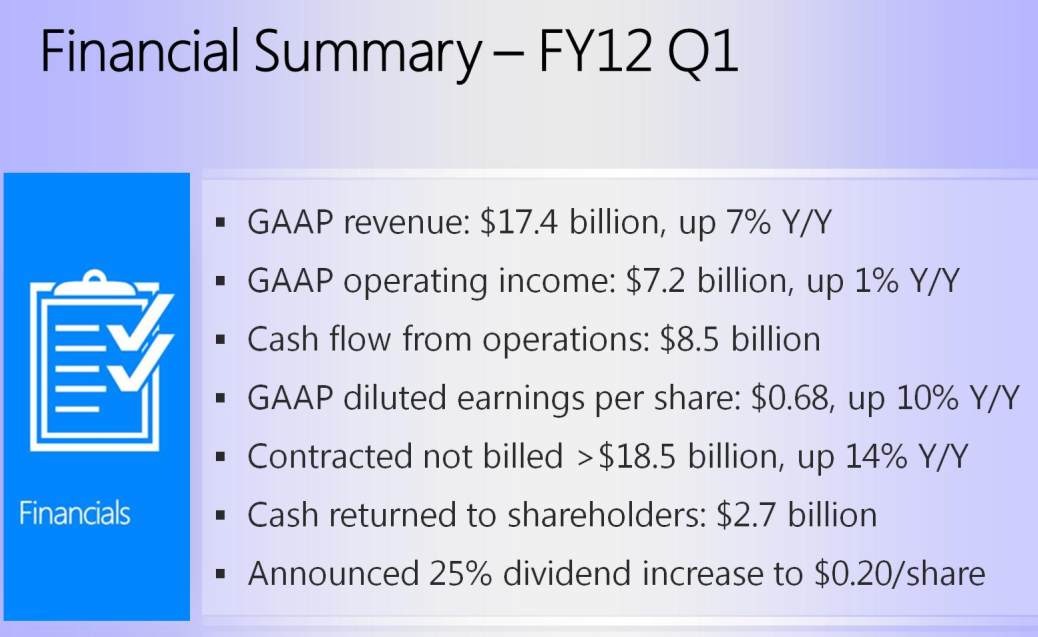Microsoft's future growth: Windows Phone, Windows 8 wild-cards

Microsoft's first quarter played out largely as expected---Office, Lync, servers and tools carried the day---but there are multiple wild-cards that need to be considered before assuming that the software giant can juice growth again.
These days Microsoft looks like a value stock---little growth, but a healthy dividend. Microsoft's Windows revenue was only up 2 percent. For Microsoft to capture our imaginations again it needs a few things to go right. Among them:
- Windows Phone has to become a legit No. 3 platform and show some smartphone traction. Microsoft CFO Peter Klein said the company was confident it could be a solid No. 3.
- Windows 8 needs to put Microsoft on the tablet map.
- And Microsoft has to improve Yahoo's revenue per search metrics so it can cut some of the losses in its online unit.
In other words, Microsoft is in a big holding pattern. Analysts on Friday were handicapping Microsoft's first quarter results. The conclusion: Microsoft is a big waiting game.
Also: Microsoft earnings insights: On-premises Office still has a lot of life left | Microsoft barely beats Street, raises outlook thanks to Skype | CNET: Microsoft sees strong Office and flat Windows in quarter
Wells Fargo analyst Jason Maynard said:
We think the next major catalysts are the coming Nokia smartphones, Yahoo search improvement, and the late 2012 Windows 8 release. In the coming month we are looking forward to seeing the fruits of the Nokia partnership with new WP 7.5 smartphones. We think resolution of the Yahoo integration issues is the key to stemming the multi-billion OSD losses. The outcome to the ongoing corporate speculation around Yahoo could also play a role. Finally, we think developer commentary and hardware progress are keys to tracking the Win8 development cycle. We assume Win8 will come in the second half of calendar 2012. The latest iteration of Android tablets running 4.0 and the pending launch of Amazon's Kindle Fire are also worth watching in our view as potential viable tablet competitors.
Maynard's take is a good jumping off point to assess Microsoft's growth prospects. Let's take them in order.
Windows Phone traction. Nokia World---we'll have ZDNet UK, Mary Jo Foley and CNET News' Maggie Reardon on scene---will be the coming out party for this Microsoft-Nokia marriage. The first Nokia devices will be shown, but the biggest question for me is whether consumers will bite. Nokia can add distribution heft, but Microsoft and its partner need to inspire gadget lust around the world. The Microsoft-Nokia effort falls into the "prove it" camp to me. Until I see market share gains, color me skeptical.
Yahoo improvement. Microsoft's partnership with Yahoo is another high profile effort. Microsoft and Yahoo were supposed to be Google killers. The reality is that the revenue per search improvements just aren't there yet. Both companies say things are getting better, but the earnings need to tell the tale. Klein said:
In search, monetization of our ad platform remains below our expectations, and we continue to partner closely with Yahoo! to address the platform gaps and inefficiencies. We recently agreed to extend the RPS guaranteed payments to Yahoo! reflecting the strength of our partnership and our continued commitment and optimism about the financial opportunity ahead of us.
Windows 8: The Windows 8 launch is also huge. Windows 8 features a new interface and is designed to work equally well on PCs and tablets. That effort is daunting. Toss in potentially sluggish IT spending, Windows upgrade fatigue, weak PC sales and another round of Android 4.0 tablets and Windows 8 could be running into a buzzsaw. Also see: A deeper dive into Windows 8: can Microsoft's big bet pay off?
Deutsche Bank analyst Tom Ernst Jr. said:
We expect PC sales, especially among consumers in the developed markets to continue to be weak, but we believe that Microsoft is positioning itself in the right direction to bridge the competitive gap in the faster growing tablet and smartphone space. Windows 8, expected to be released in fall of 2012 supports the ARM chip architecture. Early reviews of Windows 8 have been positive and the availability of Windows applications on a tablet form factor could make Windows 8 tablet a formidable alternative to iPad and the Android tablets.
None of these moving parts---Windows 8, Windows Phone and Yahoo search improvements---are solid enough to even make an educated guess on how this Microsoft tale will play out. Stay tuned.
